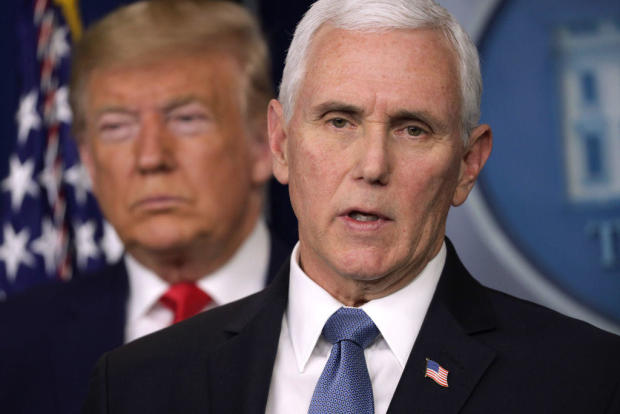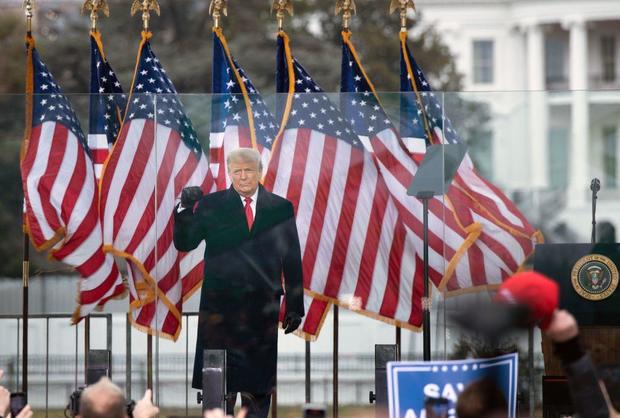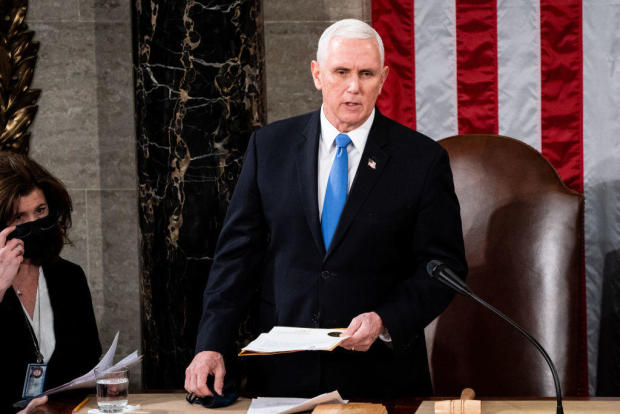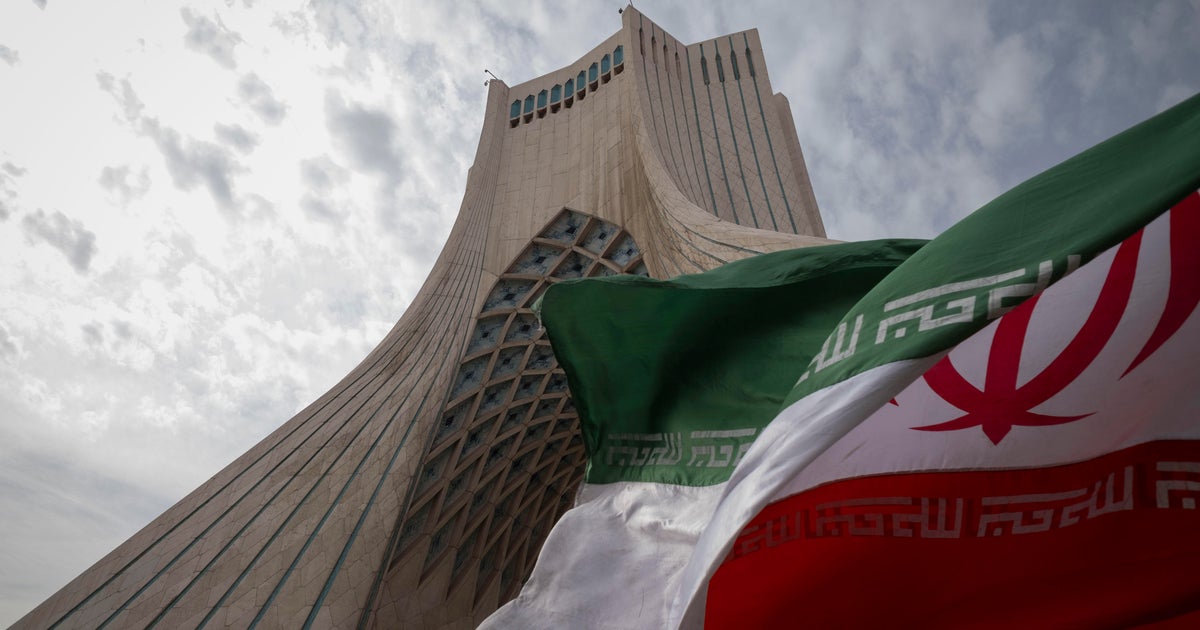Trump indictment portrays Pence as crucial figure in special counsel's case
Washington — The federal indictment of former President Donald Trump on four felony counts alleging he attempted to overturn the 2020 presidential election makes clear that former Vice President Mike Pence is a critical witness in the prosecution's case against the former president.
In the indictment, Pence is portrayed as the central figure resisting Trump and his co-conspirators' alleged schemes to delay the transfer of power before and on Jan. 6, 2021, repeatedly rebuffing Trump's demands that he reject the Electoral College results while overseeing a joint session of Congress. Trump has denied any wrongdoing and is due to be arraigned in federal court on Thursday.
Pence's actions in the lead-up to Jan. 6 have been well-documented, including by the House committee that investigated the attack and by Pence himself. He recently wrote a memoir that described his experience after the 2020 election and on Jan. 6.
But the indictment provides new insight into just how crucial Pence's recollections and "contemporaneous notes" were to special counsel Jack Smith and his investigators as they built a case that resulted in Tuesday's historic indictment. Pence appeared before the grand jury hearing evidence in Smith's investigation for seven hours in April after initially resisting a subpoena for his testimony.
His role in the case also comes as he is running far behind his former boss for the Republican presidential nomination in 2024. Pence's popularity in the Republican Party plummeted after Jan. 6, and he has struggled to poll above single digits. CBS News' chief political analyst John Dickerson thinks that dynamic gives Pence's testimony added weight, since it can't easily be dismissed as political posturing.
"It would be more complicated in terms of the case if former Vice President Pence was doing better in the campaign. In other words, if he were doing better, perhaps former President Trump could write off any testimony by him as something to try and get Trump out of the race," Dickerson said Thursday night on CBS News' "America Decides." "But Mike Pence is not doing very well in the Republican race. He may not even make the debate stage, which requires a certain level of success within his party.
"Part of that reason is because his former boss has painted him as a turncoat, completely upending the normal way in which Republicans used to talk about honor in a presidential race," Dickerson continued. "They used to say, 'Who can stand up and do the right thing at the tough moment?' That defines what Mike Pence did. And he's paying the penalty for it politically."
What the Trump indictment says about Pence
The 45-page indictment alleges Trump and his unnamed co-conspirators illegally conspired to push false allegations of widespread fraud in the 2020 election and use those doubts to block the transfer of power to Joe Biden.
When Trump's efforts to "obstruct the electoral vote through deceit of state officials" were met with "repeated failure," he and his allies allegedly turned to a new plan — organizing slates of fraudulent electors to falsely certify that he had in fact won a handful of states, which would flip the outcome in his favor, the indictment says.
The plan relied on Pence. As president of the Senate, he would oversee the formal counting of electoral votes when the joint session of Congress convened on Jan. 6. The scheme would have had him "supplant legitimate electors with the Defendant's fake electors and certify the Defendant as president," according to the indictment.
That is where Pence's role becomes more prominent in the charging document, which mentions his name or the "vice president" more than 100 times. The final sections of the indictment detail Trump's alleged repeated attempts "to enlist the Vice President to use his ceremonial role at the certification to fraudulently alter the election results," linking them to the violence at the Capitol when Pence refused to do so.
Both in public and in private, the indictment says, Trump began pressuring his vice president to alter the outcome of the election in the weeks before Jan. 6. On Dec. 23, Trump retweeted a memo called "Operation 'PENCE' CARD," which falsely claimed the vice president could unilaterally disqualify legitimate electors from six states.
The indictment details a series of conversations and meetings between Pence, Trump and other officials and associates in the days leading up to Jan. 6. One such account describes a Christmas Day phone call between Pence and Trump, in which Trump allegedly urged him to reject electoral votes. The indictment says Pence pushed back, telling Trump, "You know I don't think I have the authority to change the outcome."
The indictment cites Pence's "contemporaneous notes" when describing two conversations, including a Dec. 29 conversation with Trump.
During a Jan. 1 phone call, the indictment claims Trump called Pence over Pence's opposition to a lawsuit asking a court to rule that the vice president had the authority to reject or return votes to the states. The indictment says Trump told Pence he was "too honest" after he again objected.
On Jan. 3, the indictment says, Trump told Pence he had the absolute right to reject electoral votes and overturn the election, to which the vice president responded that he had no such authority. A federal appeals court rejected a lawsuit making that claim the day before, according to the indictment.
The Jan. 4 meeting included Trump, an unnamed co-conspirator, Pence and top Pence aides. The indictment, again citing Pence's notes, says Trump made "knowingly false claims" of election fraud, and that the president and his co-conspirator asked Pence to reject the legitimate electors or send the matter back to the states' legislatures.
"When the vice president challenged Co-Conspirator 2 on whether the proposal to return the question to the states was defensible, Co-Conspirator 2 responded, 'Well, nobody's tested it before,'" the indictment says. "The vice president then told the Defendant, 'Did you hear that? Even your own counsel is not saying I have that authority.' The Defendant responded, 'That's okay, I prefer the other suggestion' of the Vice President rejecting the electors unilaterally."
On Jan. 5, at Trump's direction, the indictment says Pence's chief of staff and counsel met again with Co-Conspirator 2, who advocated for Pence to do what Trump said he preferred the day before — unilaterally reject electors from multiple states. During the meeting, Co-Conspirator 2 "privately acknowledged to the vice president's counsel that he hoped to prevent judicial review of his proposal because he understood that it would be unanimously rejected by the Supreme Court," the indictment says.
Trump applied public pressure on Pence and repeatedly said Pence had the authority to reject electors, despite the vice president saying he would not do so. He continued to encourage his supporters to show up in Washington on Jan. 6.
Trump called Pence at 11:15 a.m. on Jan. 6, again pressuring him to reject or return Mr. Biden's electoral votes, the indictment says. Not long after, addressing the crowd of supporters that had gathered near the White House, Trump said, "I hope Mike is going to do the right thing."
A crowd soon gathered at the Capitol. Shortly before 1 p.m., Pence issued a lengthy statement explaining that his role as president of the Senate did not give him the "unilateral authority to determine which electoral votes should be counted and which should not."
"Thereafter, a mass of people — including individuals who had traveled to Washington and to the Capitol at the Defendant's direction — broke through barriers cordoning off the Capitol grounds and advanced on the building, including by violently attacking law enforcement officers trying to secure it," the indictment says.
The indictment highlights Trump's tweet at 2:24 p.m., as his supporters stormed the Capitol: "Mike Pence didn't have the courage to do what should have been done to protect our country and our Constitution, giving states a chance to certify a corrected set of facts, not the fraudulent or inaccurate ones which they were asked to previously certify. USA demands the truth."
One minute later, the Secret Service "was forced to evacuate the Vice President to a secure location," the indictment says. Members of the crowd chanted "Hang Mike Pence" and "Bring him out!"
Pence's detail whisked him away from his ceremonial office to a discreet, secure location, moments before the violent mob reached him.
Hours later, once the violence subsided, he returned to the chamber and Congress continued counting votes.
"At 3:41 a.m. on January 7, as President of the Senate, the Vice President announced the certified results of the 2020 presidential election in favor of Biden," the indictment concludes.
Pence's reaction to the indictment
Pence responded to the indictment while speaking to reporters in Indianapolis on Wednesday.
"Sadly, the president was surrounded by a group of crackpot lawyers that kept telling him what his itching ears wanted to hear," he said. "And while I've made my case to him of what I've understood my oath to the Constitution to require, the president ultimately continued to demand that I choose him over the Constitution."
Pence said that "anyone who puts themself over the Constitution should never be president of the United States, and anyone who asks someone else to put themselves over the Constitution should never be president of the United States again."
In an interview with Fox News on the same day, Pence went further, saying, "I don't know if the government can meet the standard, the burden of proof beyond reasonable doubt for criminal charges. But the American people deserve to know that President Trump and his advisers didn't just ask me to pause — they asked me to reject votes, return votes, essentially to overturn the election."
While some Democrats have commended Pence for standing his ground, his statement and his prominence in the special counsel's case won't endear him to the Republican voters he needs to capture the nomination. But, as Dickerson noted, there isn't much love lost between Trump's most ardent supporters and Pence at this point.
It's not yet clear if Pence will be called to testify if the case makes it to trial.
"I'm not sure that he'll be called to testify," longtime senior Pence adviser Marc Short told CNN last Friday. "He's a central part of this, sure, but I think much of what he's represented is public."






